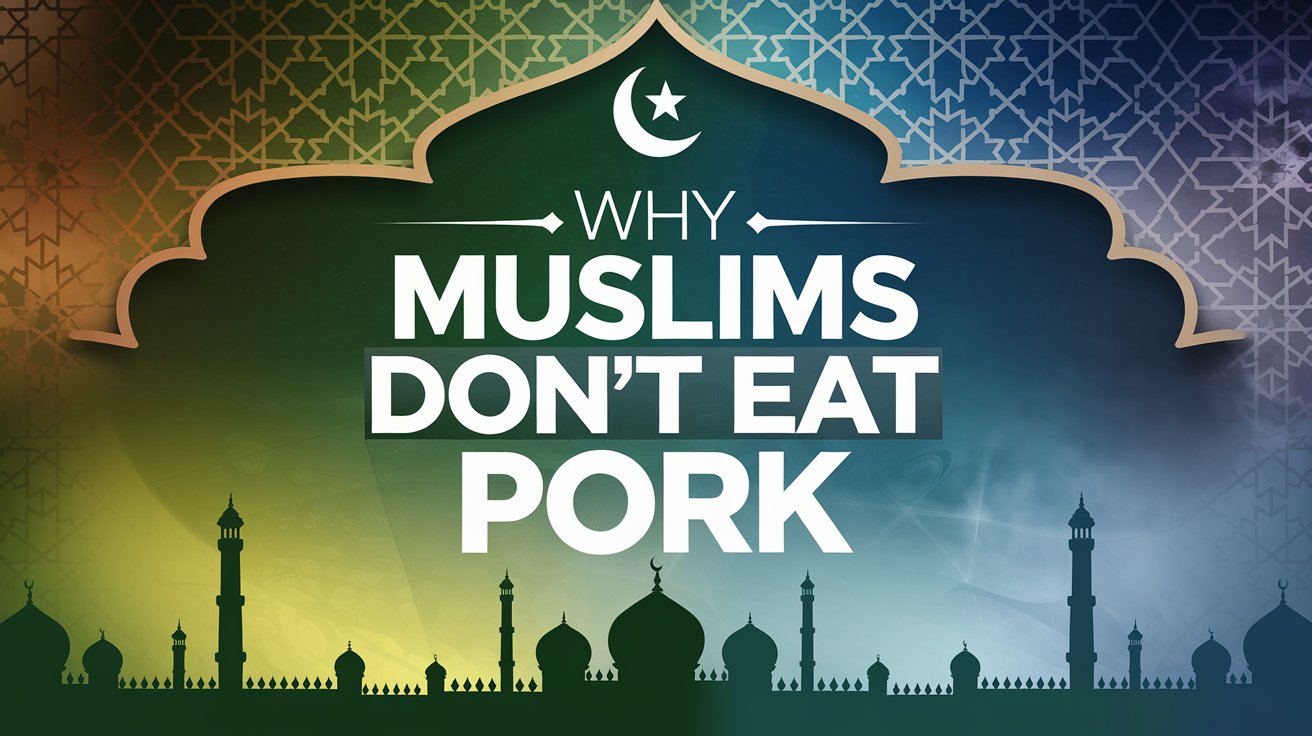In many countries, pork is commonly consumed, and people use it in many kinds of food items. Pork is particularly popular in Western countries. But, in Islamic countries, pork is never eaten and not sold. people who are not Muslims frequently ask why Muslims do not consume pork.
In this blog post, we will tell you about why Muslims do not eating pork. We’ll also look into the science of eating pork to see that it’s healthy or harmful for our health. So now lets start.
Why Muslims Don’t Eat Pork
Muslims avoid eating not only pork but also several other animals and birds that Islam considers haram (forbidden). The Quran clearly mentions the reason why Muslims don’t eat pork. Allah has strictly prohibited the consumption of pork. In Surah Al-Baqarah (2:173), Allah says:
“He has only forbidden to you dead animals, blood, the flesh of swine, and that which has been dedicated to other than Allah.”
This verse makes it clear that pork is not allowed for Muslims. Additionally, our beloved Prophet Muhammad (peace be upon him) also instructed Muslims to avoid eating pork. In a hadith, narrated by Jabir bin Abdullah, the Prophet said:
“Allah and His Messenger have prohibited the consumption of dead animals, blood, and the flesh of swine.” (Sahih Muslim)
For Muslims, the command from Allah is enough reason to avoid pork. When Allah forbids something, we obey without needing further explanation. It’s a matter of faith and submission to the will of Allah, which is -\.6352000*2central to the Islamic way of life.
The Quran talks about dead animals, and many non-Muslims ask, “If all animals die, does that mean all meat is forbidden?” Muslims still eat meat, so we need to understand this properly.
Islam forbids eating dead animals, blood, and animals sacrificed in the name of anyone other than Allah. Muslims must slaughter animals in a specific way called zibah.
There are other things that are also haram, but pork is specifically mentioned in the Quran. If even a hair of it falls into something, that thing becomes impure.
During the slaughter, they recite a prayer and mention only the name of Allah. This makes the meat halal. If anyone mentions another name during the slaughter, the meat becomes haram. Also, Islam forbids consuming blood, so Muslims cannot drink it. This means Muslims can eat only halal animals that they slaughter in the Islamic way.
We Muslims believe that when we do good deeds and obey Allah, He will send us to Jannah (paradise). Jannah is a beautiful place created by Allah for those who follow His commands and do good. However, Allah has also created Hell for those who commit sins. This is why Muslims avoid eating pork, taking care of their health while also obeying Allah, and preparing themselves for Jannah.
What Happens If a Muslim Eats Pork?
In Islam, eating pork is considered an extremely serious sin because it violates Allah’s clear command. The Quran clearly states in Surah Al-Baqarah (2:173):
“He has forbidden you dead animals, blood, the flesh of swine, and that which has been dedicated to other than Allah.”
When a Muslim intentionally eats pork, they challenge Allah’s command, which might result in spiritual results. Eating haram (forbidden) foods may destroy a person’s faith and separate them from Allah.
Prophet Muhammad (peace be upon him) emphasized the significance of avoiding haram foods. In a hadith recounted by Abu Huraira, the Prophet stated:
“Allah is pure and only accepts what is pure.” (Sahih Muslim)
If a Muslim accidentally eats pork, there is no sin on them. It’s similar to someone accidentally eating something during Ramadan; the fast doesn’t break. In the same way, accidentally eating pork does not count as a sin. However, once you realize that you have eaten something haram, you should seek forgiveness from Allah and repent.
Can muslim sale pork meat?
As a Muslim, selling pork is a big mistake. Because It’s not about avoiding eating it ourselves; we are also barred from participating in any aspect of the pork trade. The Quran and Hadith make it clear that dealing the pork is off-limits.
Some muslim scholars even argue that selling pork is a greater sin than eating it! That’s since by selling it, you encourage others to engage in the sin of eating pork. In a spiritual sense, it is similar to being an accomplice to a crime.
Prophet Muhammad (peace be upon him) also said in a hadith, narrated by Jabir bin Abdullah:
“Allah has forbidden the sale of alcohol, dead meat, pigs, and idols.” (Sahih Bukhari)
So, whether it’s selling, buying, or even transporting pork, Muslims steer clear of it altogether. Our faith guides us to engage in halal (permissible) business practices that align with Allah’s commands. And when it comes to pork, the message is loud and clear: it’s a definite “no sale” zone for Muslims.
Health Problems
In addition to religious reasons, Muslims avoid eating pork due to many kinds of health problems. One of the primary issues with pork is that it has the potential to harbor parasites that can cause illness in humans. These microscopic organisms live inside the pig and can be passed to humans when they eat the meat. Some of these parasites can cause serious symptoms such as high fever, muscle aches, and even neurological disorders.
Another health hazard associated with pork is the presence of harmful bacteria. These microorganisms can thrive inside the pig and contaminate the meat, rendering it unsafe for consumption. If individuals eat pork that is contaminated with these bacteria, they may develop illnesses like food poisoning, which can cause symptoms such as abdominal pain, diarrhea, and even more serious complications.
Moreover, consuming pork can have detrimental effects on the cardiovascular system. Pork is known to be high in saturated fat and cholesterol, which are substances that can accumulate in the arteries over time. When this occurs, it can contribute to the development of high blood pressure and other cardiovascular problems. Regular consumption of pork may increase the likelihood of developing heart disease and stroke in the long run.
Given these potential health risks, many Muslims believe that abstaining from pork is not only a religious obligation but also a means of safeguarding their well-being. By opting for alternative sources of protein, such as other meats or plant-based options, they can mitigate the dangers associated with consuming pork.
Other Meats Muslims Can Eat
Although Islam does not allow pork, Muslims can still enjoy many other types of meat. lots of types meats avalaible for eaating. Beef, chicken, and mutton (which comes from sheep) are all considered “halal” meats. Halal means that the meat is permissible according to Islamic law. To make the meat halal, one must slaughter the animal in a specific way and say the name of Allah over it.
Many Muslims choose to eat only halal meat because it follows their religious beliefs. They can find halal meat at special grocery stores or restaurants that follow Islamic guidelines. Muslims eat halal meat to feel connected to their faith and to know that their religion approves the food they are eating.
In addition to meat, Muslims can also eat vegetarian foods. Fruits, vegetables, grains, and dairy products are all halal and can be part of a healthy Muslim diet. Some Muslims choose to be vegetarian or vegan, which means they don’t eat any animal products at all. You make this personal choice, and Islam does not require it.
The important thing is that Muslims have many options for foods that fit within their religious beliefs. Whether they choose to eat halal meat or follow a vegetarian diet, there are plenty of delicious and nutritious foods available to them. By making choices that align with their faith, Muslims can feel good about what they eat while still enjoying a variety of tasty meals.










